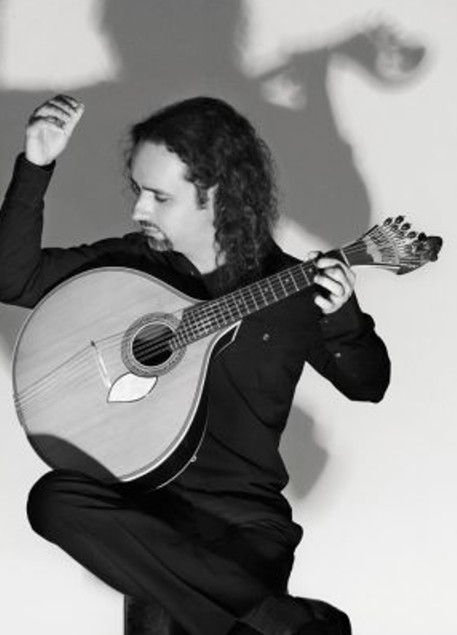Pedro Henriques da Silva (Department of Music and Performing Arts Professions, NYU Steinhardt)
An eclectic and versatile Portuguese composer and guitarist, Dr. Pedro Henriques da Silva composes in just about every style and plays 18 different instruments. Recently, he has recorded for Oscar-winner Michel Gondry’s films “Be Kind Rewind” (ft. Jack Black, Danny Glover, Mia Farrow, Sigourney Weaver and Mos Def) and “Interior Design”; composed for Richard Témtchine’s (“Dummy” 2002, ft. Adrien Brody, Milla Jovovich) new film “How to Seduce Difficult Women” (ft. Louis-Do de Lencquesaing, Rachel Roberts, Paul Lazar); and composed for the prize-winning documentary “Tijuana nada más…” by Yolanda Pividal and Carmen Vidal, a winner of a student Oscar. Dr. da Silva has recorded as well with acclaimed film composer Jean-Michel Bernard (“The Science of Sleep”, “Human Nature”). He is also collaborating on an upcoming ballet with legendary choreographer Hector Zaraspe (professor of Rudolf Nureyev; choreographer of the films “Fame”, “Spartacus”, among others).
Dr. da Silva’s compositions and performances have taken him to over a dozen countries in four continents: throughout the US, Canada, Mexico, Ecuador, Argentina, Portugal, Spain, Italy, Belgium, Hungary, Denmark, Finland, and India. He has performed some of the most important concert halls in the world: Carnegie Hall, Lincoln Center, and Joe’s Pub in New York; Centro Cultural de Belém in Lisbon, Portugal; Auditorio Silvestre Revueltas in Mexico City; Bartók Radio in Budapest, Hungary; among many others. At Carnegie Hall Dr. da Silva has had three performances to date in both the Isaac Stern Auditorium and Weill Hall: as a soloist, as part of an ensemble, and as a composer. He has written more than ten orchestral works for the Philharmonic Orchestra of the Americas, and has performed with them and other orchestras such as the Pittsburgh Symphony. In October 2008, he founded the Manhattan Camerata with his wife, Argentine pianist, composer, and NYU alumna, Lucía Caruso. The Manhattan Camerata is an original and innovative chamber orchestra whose repertoire is mainly focused on early music (Medieval, Renaissance, Baroque), contemporary, and World music.
Dr. da Silva holds a masters and a doctorate in composition from the Manhattan School of Music where he studied with Nils Vigeland and Richard Danielpour, and has been an adjunct assistant professor of composition at New York University since September 2006. He wrote his doctoral thesis – “Modal Relations and Classification” – on modes and scales from all over the World, classifying, researching and analyzing over 2000 scales from four different standpoints: acoustics, ethnomusicology, music history and set-theory. Some of the modal systems he investigated are: Indian, Chinese, Japanese, Arabic, Thai, Indonesian, Persian, Turkish, Ancient Greek, Ecclesiastical, as well as African and South American music.
Being the son of an ambassador, he grew up in several countries – the US, France, Portugal, Canada, Spain and Belgium – and speaks six languages. As a result of this upbringing and of his lifelong exploration of World music and ethnomusicology, he has collected and performs 18 instruments, including: sitar; bouzouki; cuatro; oud; lute; balalaika; mandolin; mandola; bass; ukulele; cavaquinho; viola; braguesa; classical, electric and Portuguese guitars. He studied sitar in India in 2001 and 2002 with Neeraj Prem, who is a disciple of Ustad Vilayat Khan’s gharana – the most respected musician in India when he was alive.
His acoustical investigations have led him to explore the possibilities of electronic instruments and software to create microtonal music, and to reproduce the subtleties of historic and non-Western tuning systems. To that effect, he has explored the hundreds of tuning systems of Logic, Scala, and several iPhone applications, and is a proponent of Hermode tuning and custom tunings. Dr. da Silva believes that technology can and should be used to our advantage in creating the beautiful just intonation intervals that many non-Western instruments are capable of producing, and use these intervals harmonically like any fine orchestral musician might do in specific harmonic contexts. The best way to truly simulate orchestral players, or to simply create the most purely tuned tonal harmonies, is then to use the adaptive Hermode tuning that can be found in software such as Logic.
Dr. da Silva has given master classes and lectures in the fields in which he specializes: composition, ethnomusicology, tuning, Wagner, Messiaen, film scoring, John Williams’ leitmotif system, and guitar, in the US, Argentina and Mexico. Also, he has recently joined the faculty of the online music community Musiccomm along with some of the most renowned musicians of today, mostly including musicians of the New York Philharmonic and Metropolitan Opera.
